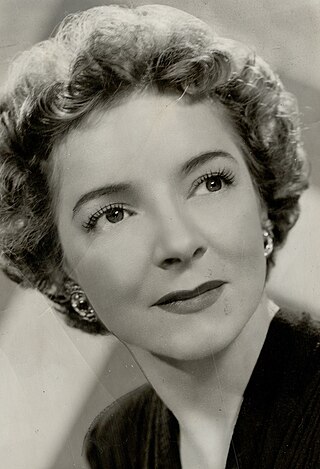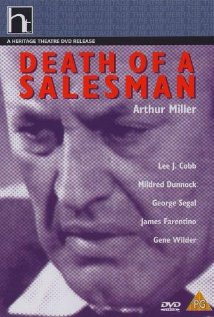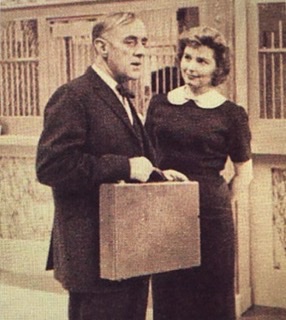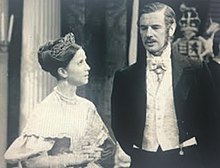
Helen Hayes MacArthur was an American actress whose career spanned 82 years. She eventually received the nickname "First Lady of American Theatre" and was the second person and first woman to have won an Emmy, a Grammy, an Oscar, and a Tony Award. She was also the first person to win the Triple Crown of Acting. Hayes also received the Presidential Medal of Freedom, America's highest civilian honor, from President Ronald Reagan in 1986. In 1988, she was awarded the National Medal of Arts.

Julia Ann Harris was an American actress. Renowned for her classical and contemporary roles, she earned numerous accolades including the record five Tony Awards for Best Actress in a Play, three Emmy Awards, and a Grammy Award in addition to nominations for an Academy Award, and a BAFTA Award. She was inducted into the American Theatre Hall of Fame in 1979, received the National Medal of Arts in 1994, the Special Lifetime Achievement Tony Award, and the Kennedy Center Honor in 2005.

Susan Seaforth Hayes is an American television actress. She is best known for her portrayal of Julie Williams on the NBC drama Days of Our Lives, and her intermittent portrayal of Joanna Manning on the CBS daytime drama The Young and the Restless. She began playing the role of Julie on Days of Our Lives in 1968, and is the only actress to appear on the show for all seven decades it has been on the air. Seaforth Hayes still regularly appears on Days as Julie.

James Donald was a Scottish actor. Tall and thin, he specialised in playing authority figures, particularly military doctors.

Pack of Lies is a 1983 play by English writer Hugh Whitemore, itself adapted from his Act of Betrayal, an episode of the BBC anthology series Play of the Month transmitted in 1971.

Macbeth is a 1960 television film adaptation of the William Shakespeare play presented as the November 20, 1960 episode of the American anthology series Hallmark Hall of Fame. The series' second production of the play was, like the 1954 live telecast, also directed by George Schaefer, and again starred English-born American actor Maurice Evans and Australian actress Judith Anderson. The supporting cast, however, was different, consisting entirely of British actors, and was filmed on location in Scotland; the 1954 version had used a mostly American cast.
Barefoot in Athens is a 1966 Hallmark Hall of Fame television film directed by George Schaefer. It stars Peter Ustinov, Geraldine Page, Anthony Quayle, Lloyd Bochner and Christopher Walken in his film debut.
The Magnificent Yankee is a 1965 biographical film in the Hallmark Hall of Fame television anthology series. The film was adapted by Robert Hartung from the Emmet Lavery 1946 play of the same title, which was in-turn adapted from the 1942 book Mr. Justice Holmes by Francis Biddle. The story examines the life of United States Supreme Court Justice Oliver Wendell Holmes. Alfred Lunt and Lynn Fontanne won Primetime Emmy Awards for their performances. Eduard Franz reprised his role as Louis Brandeis from the original 1950 film version.

Death of a Salesman is a 1966 American made-for-television video adaptation of the 1949 play of the same name by Arthur Miller. It was directed by Alex Segal and adapted for television by Miller. It received numerous nominations for awards, and won several of them, including three Primetime Emmy Awards, a Directors Guild of America Award and a Peabody Award. It was nominated in a total of 11 Emmy categories at the 19th Primetime Emmy Awards in 1967. Lee J. Cobb reprised his role as Willy Loman and Mildred Dunnock reprised her role as Linda Loman from the original 1949 stage production.
Victoria Regina is a 1934 play by Laurence Housman about Queen Victoria, staged privately in London in 1935, produced on Broadway in 1935, and given its British public premiere in 1937.
The Triple Crown of Acting is a term used in the American entertainment industry to describe actors who have won a competitive Academy Award, Emmy Award, and Tony Award in the acting categories, the highest awards recognized in American film, television, and theater, respectively. The term "Triple Crown" is used in other competitive areas, such as the Triple Crown of Horse Racing.

"Little Moon of Alban" was an American television play broadcast by NBC on March 24, 1958, as part of the television series, Hallmark Hall of Fame. It was written by James Costigan, directed by George Schaefer, and starred Julie Harris and Christopher Plummer.
"Sacco-Vanzetti Story" is a two-part American television play that was broadcast on June 3, 1960, and June 10, 1960, as part of the NBC Sunday Showcase series.
"Target for Three" was an American television play broadcast live on October 1, 1959, as part of the CBS television series, Playhouse 90. It was the first episode of the fourth season of Playhouse 90 and the 118th episode overall.

"Helen Morgan" is an American television play broadcast on May 16, 1957, as part of the CBS television series, Playhouse 90. It was the 33rd episode of the first season of Playhouse 90.
The 1958 Sylvania Television Awards were presented on January 22, 1959, at the Plaza Hotel in New York City. The Sylvania Awards were established by Sylvania Electric Products.

The Moon and Sixpence was an American television movie broadcast on NBC on October 30, 1959. The production, starring Laurence Olivier, was adapted by S. Lee Pogostin from the novel by Somerset Maugham. The production won multiple Emmy and Sylvania Awards, including awards for Olivier's acting, Pogostin's adaptation, and Robert Mulligan's direction.
"The Turn of the Screw" was an American television movie broadcast by NBC on October 20, 1959, as the third episode of the television series, Ford Startime. It was written by James Costigan as an adaptation of Henry James' novella of the same name. John Frankenheimer was the director and producer.

"The Wicked Scheme of Jebal Deeks" was an American television play broadcast by NBC on November 10, 1959, as part of the television series, Ford Startime. It was written by John D. Hess. Franklin Schaffner was the director and producer. Alec Guinness starred as Jebal Deeks and received an Emmy nomination for outstanding single performance by an actor.
Alexandra Wager is an American former child actress.











